
Clean energy: the Moldovan villages setting up their own energy supply sources
As the European Union’s Member States mark EU Sustainable Energy Week, stakeholders are discussing and sharing their experience in renewable energy sources, energy security strategies and environmental issues. In this article, we look at some examples of businesses in the field of renewable energy developed in Moldova with the support of the EU funds, including an entire solar energy park set up in a small rural village.
Over the years, the European Union has been supporting and contributing to the development of projects relating to energy efficiency and reduction of carbon emissions in Moldova. Each year, Moldovan municipalities receive financial support from the Moldovan Energy Efficiency Fund in order to upgrade their buildings to higher energy efficiency standards. The Energy Efficiency Fund has been supported both financially and technically by the EU. Meanwhile, thanks to the EU4Energy programme funded by the EU, high-level policy talks are developing the legislative framework for the energy sector.
An important endeavour for the EU involves supporting countries in their transition to renewable energy. The Energy and Biomass Project is one of the EU’s most significant projects in the Moldovan energy sector, helping to implement green energy use in the country. Some 140,000 Moldovans have already benefited from this project.
“The door leading to the school gym was covered in frost and ice in severe winters”
During its seven years of implementation, the EU’s Moldova Energy and Biomass Project (MEBP) has helped 300 public institutions switch to cost-effective green energy heating.
Among these is Baltata village gymnasium, a high school in Criuleni district, where 156 children attend classes every day. For years, a gas boiler was the sole source of heating for the school. “The maximum temperature inside the school was 12 °C, while the door leading to the gym was covered in frost and ice in severe winters,” recalls Galina Todoriuc, the school’s headteacher. The school budget had to pay MDL 200,000 [€10,000] for its heating each year.
In 2014, the district council allocated MDL 450,000 [€23,000] to replace the school’s radiators, as well as the heating system. At the same time, the school was selected to take part in the Moldova Energy and Biomass Project: it received an EU grant of €66,000 [MDL 1.3 million] for the installation of two biomass-fired boilers.
“Now, in winter, the temperature goes as high as 22 °C,” says Todoriuc. The changes were beneficial for the school budget as well. “This year, for example, we paid only MDL 70,000 [€3,500] for the entire year,” adds the headteacher.
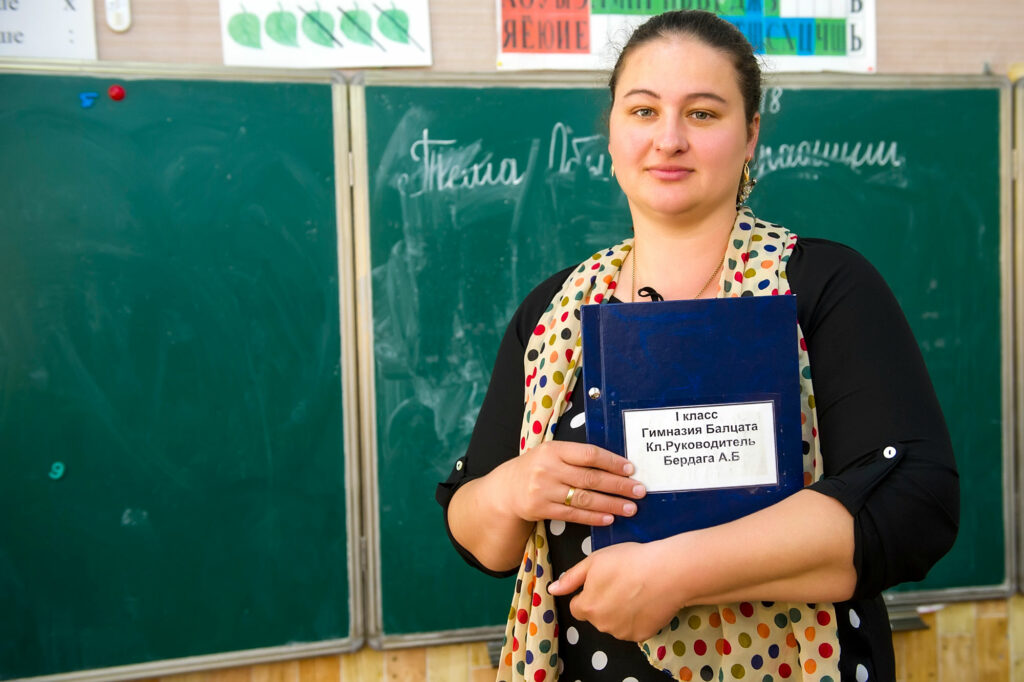 Teacher Alina Berdaga, school in Baltata, Moldova.
Teacher Alina Berdaga, school in Baltata, Moldova.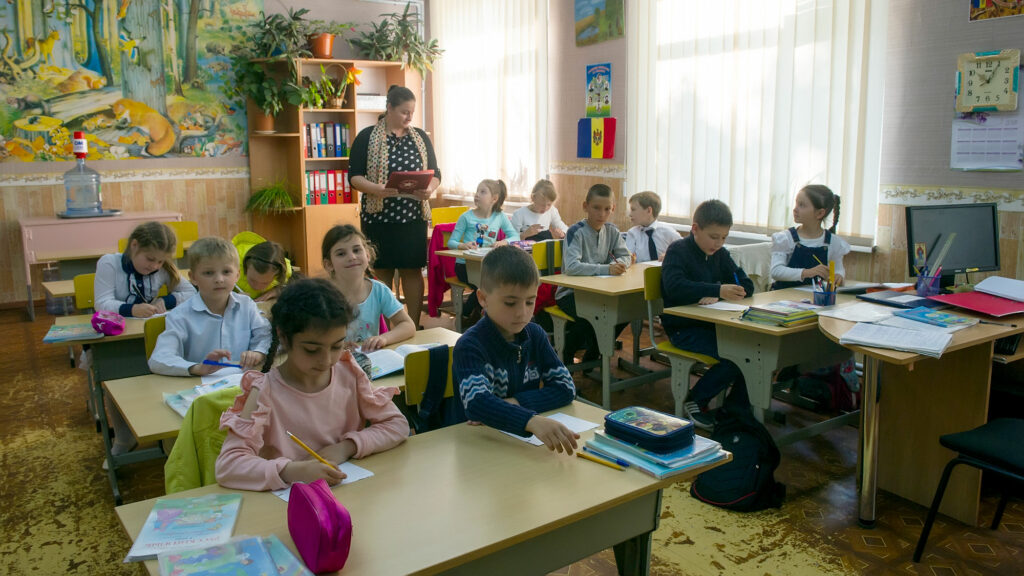 Children at school in Baltata, Moldova.
Children at school in Baltata, Moldova.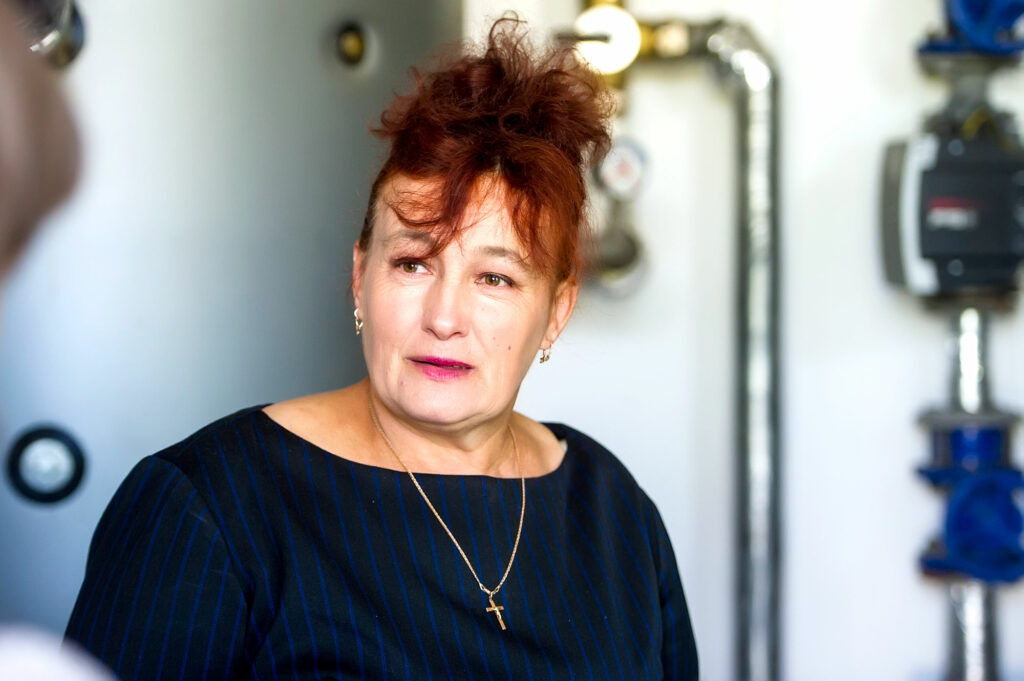 Galina Todoriuc, school director in Baltata, Moldova.
Galina Todoriuc, school director in Baltata, Moldova. Children at school in Baltata, Moldova.
Children at school in Baltata, Moldova.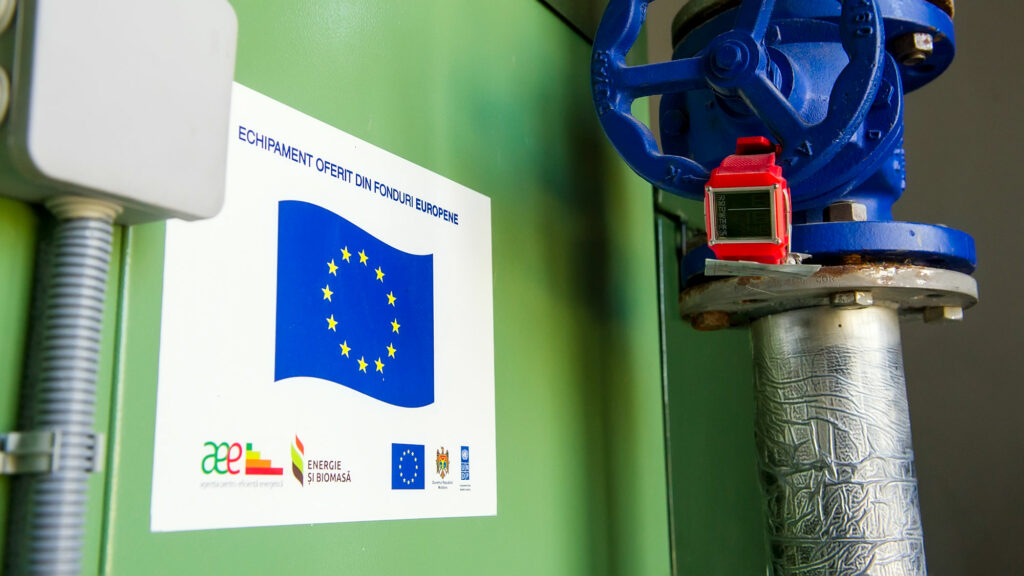 Biomass boiler at school in Baltata, Moldova.
Biomass boiler at school in Baltata, Moldova.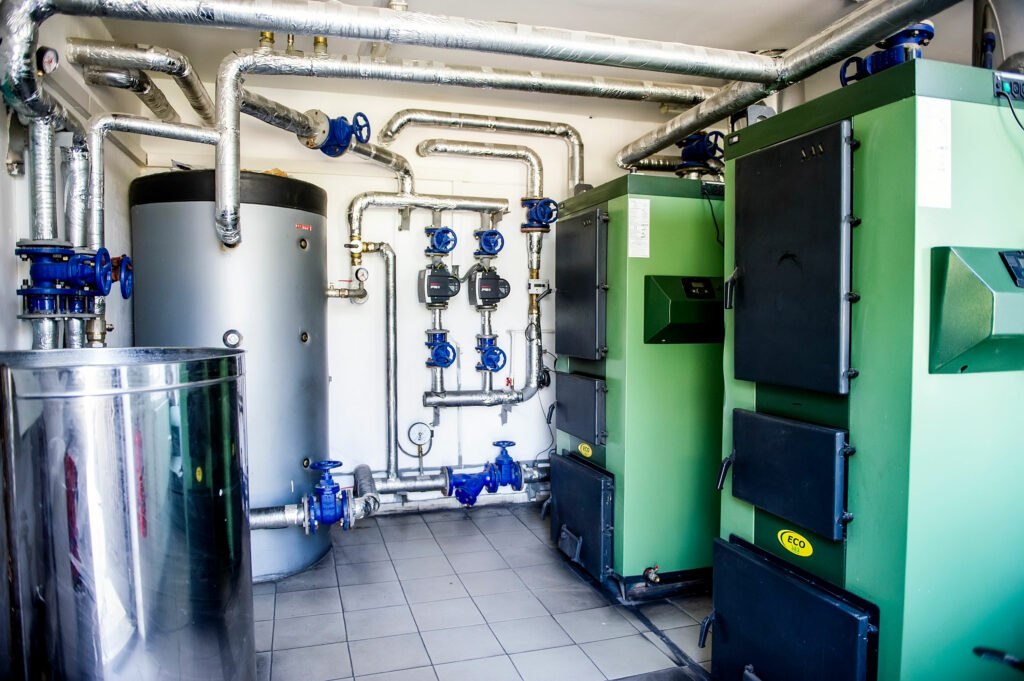 Biomass boiler at school in Baltata, Moldova.
Biomass boiler at school in Baltata, Moldova.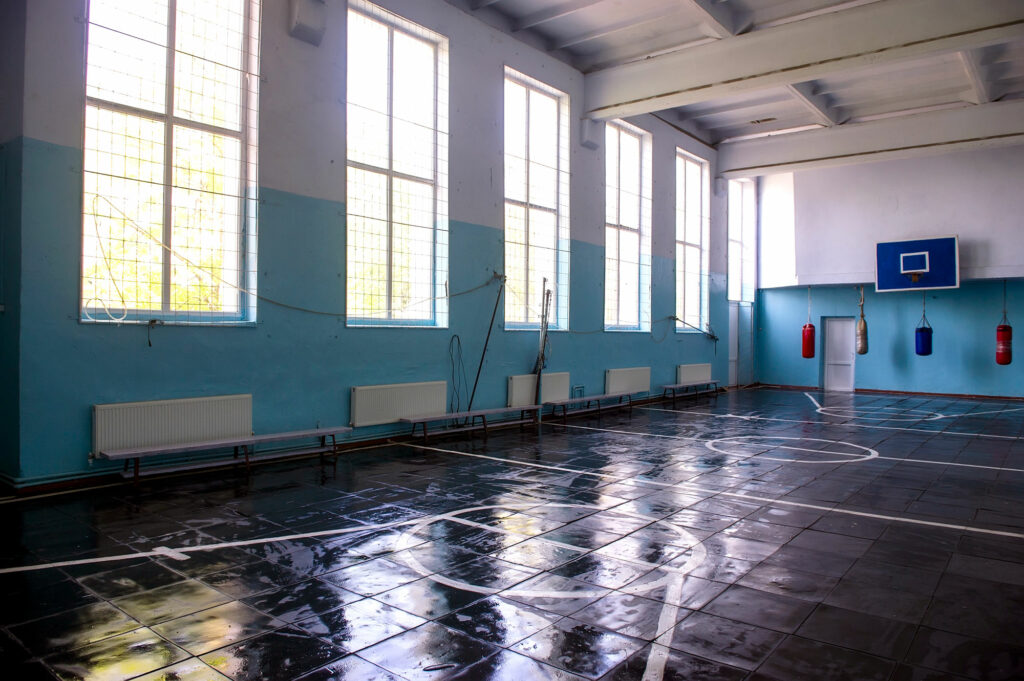 School gym at Baltata, Moldova.
School gym at Baltata, Moldova.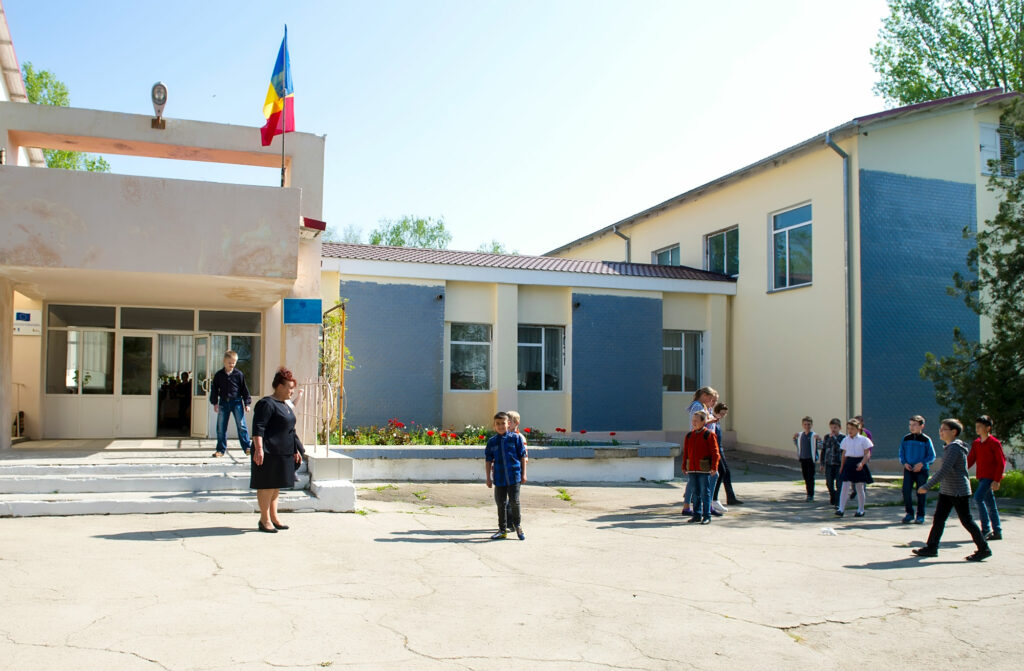 School in Baltata, Moldova
School in Baltata, Moldova
“We even produced briquettes from bulrush”
For a number of private companies in Moldova, biofuel, as well as the Energy and Biomass Project, turned into a profitable business opportunity. Two Chisinau-based entrepreneurs, Serghei Alexei and Dmitri Asoscov, decided to open a joinery workshop together. Soon afterwards, they both realised that simply discarding the waste, in their case woodchips, was no good for the business.
They soon started processing the waste materials from production into briquettes and created a new company, named Bioflame. With the support of the EU, the entrepreneurs purchased sophisticated processing equipment that allowed them to produce briquettes from other materials as well. Now, the company produces briquettes from buckwheat husks, almond and walnut shells and sunflower husks.
According to Dmitri, their main customers today are private household owners and distributors across the country. Bioflame manages to sell up to 2,000 tonnes of briquettes each season.
There are also companies specialised in briquette production exclusively in Moldova. Ludmila Abramciuc, director of Ecobricheta, launched the production of briquettes and pellets in her native town of Balti back in 2008.
Abramciuc says that the company acquired most of its sophisticated equipment with the support of the EU-financed Moldova Energy and Biomass project. Ecobricheta’s production capacity was boosted and the company started to find customers – first private houses, followed by public institutions such as kindergartens and schools.
Abramciuc feels confident that there is a double benefit to using briquettes and pellets for heating instead of wood, coal or gas. “Firstly, the monthly bills [after switching to] biofuel are two-and-a-half to three times lower. The second benefit lies with environmental awareness: reduction of carbon emissions and use of waste,” says Abramciuc.
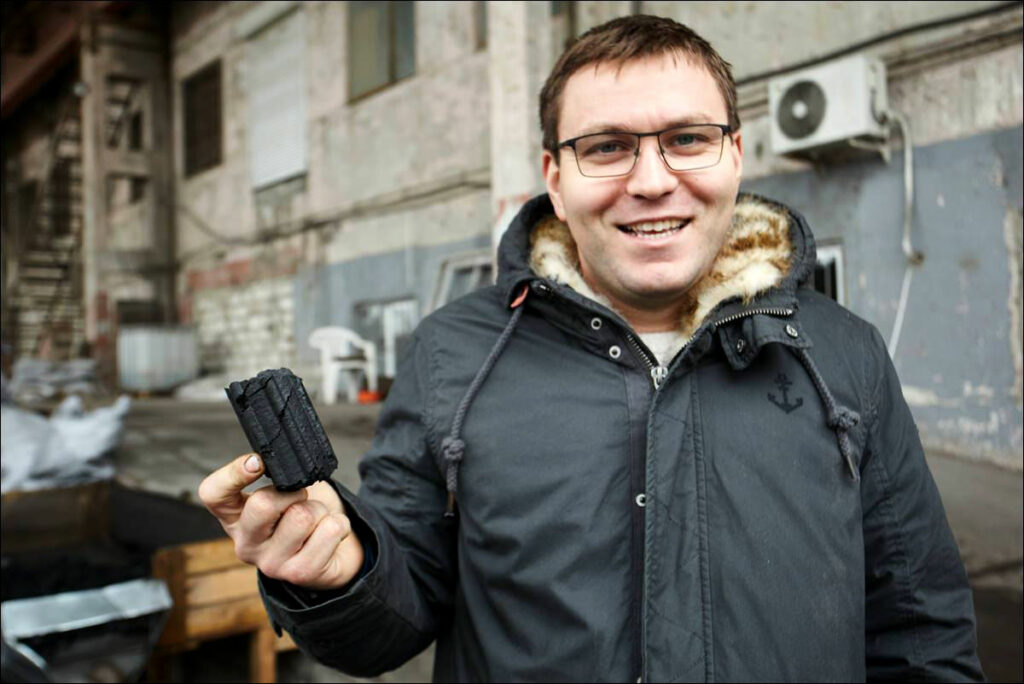 Dumitru Asoscov, cofounder of Bioflame Company.
Dumitru Asoscov, cofounder of Bioflame Company.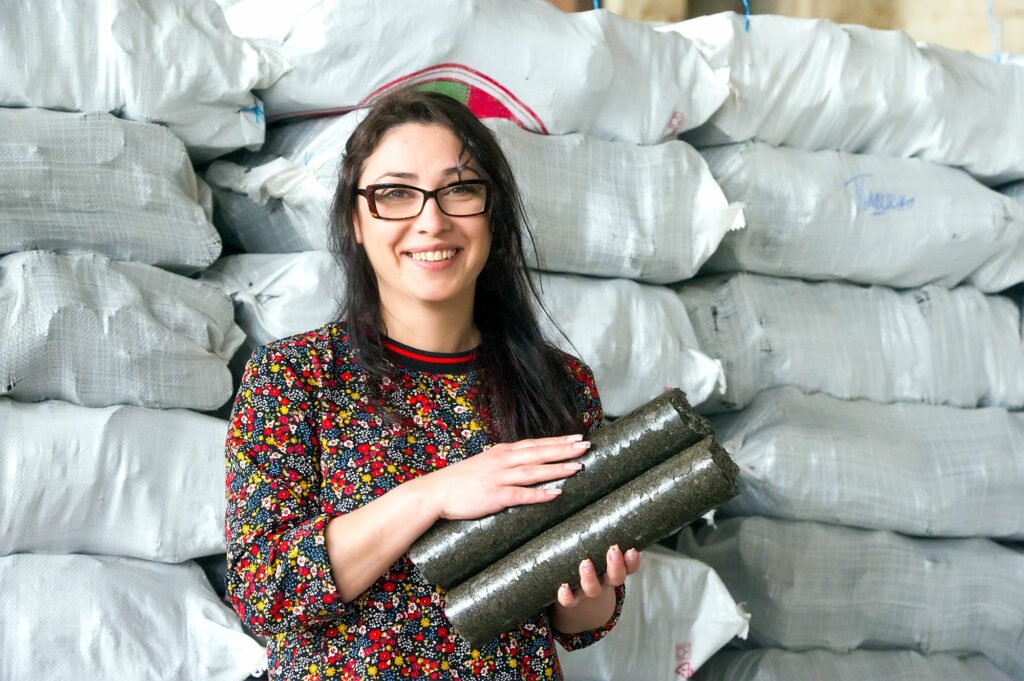 Ludmila Ambramciuc, owner of “Ecobricheta” in Balti, Moldova
Ludmila Ambramciuc, owner of “Ecobricheta” in Balti, Moldova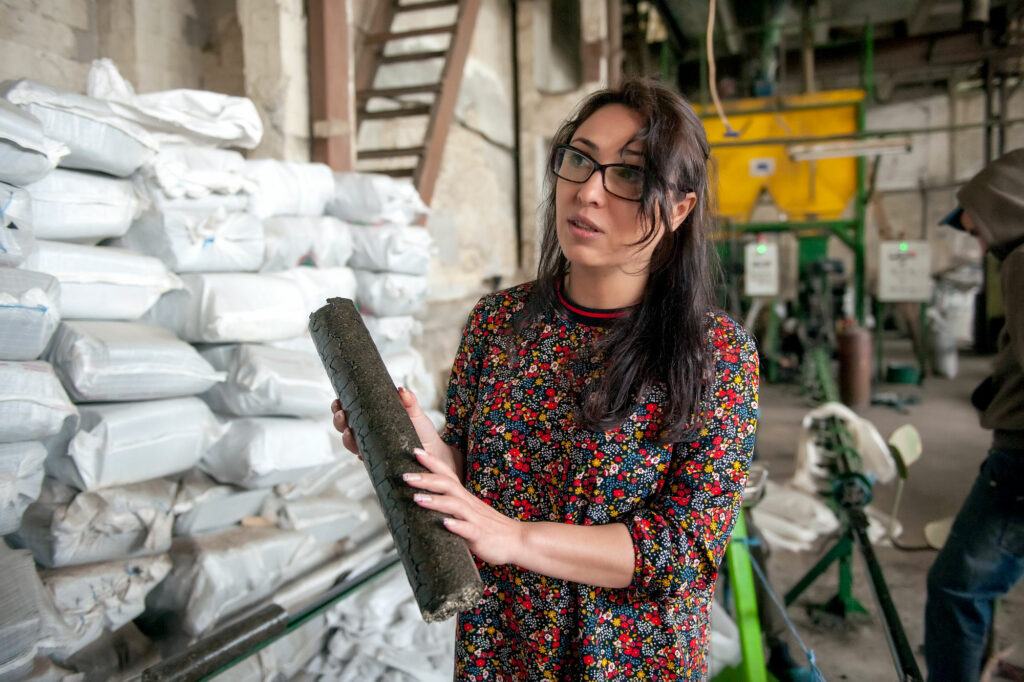 Ludmila Ambramciuc, owner of “Ecobricheta” in Balti, Moldova
Ludmila Ambramciuc, owner of “Ecobricheta” in Balti, Moldova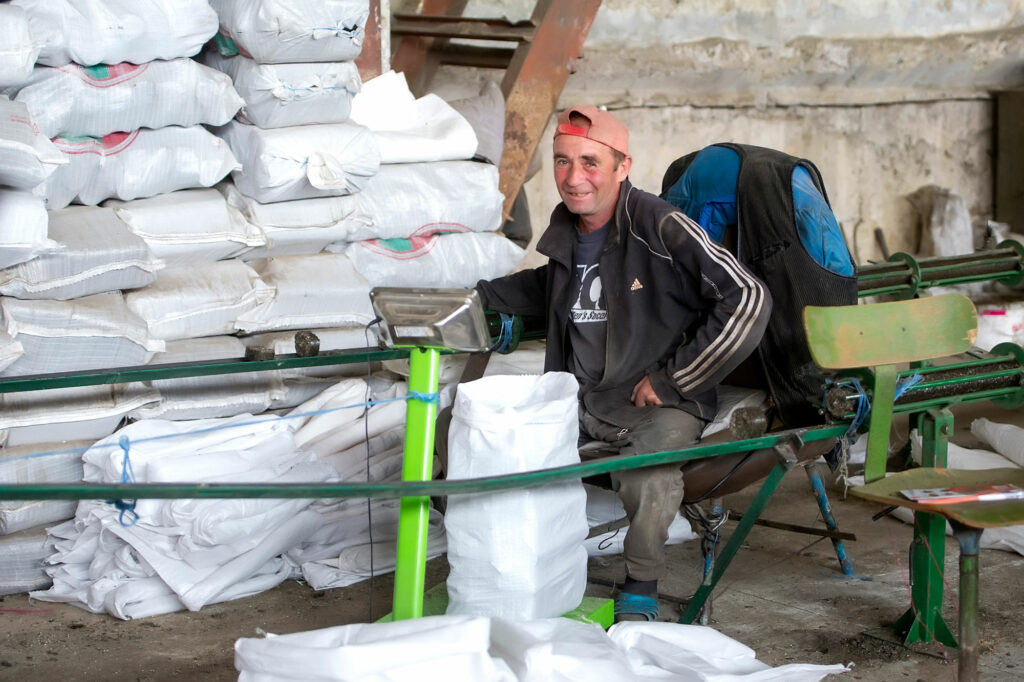 Worker at “Ecobricheta”in Balti, Moldova.
Worker at “Ecobricheta”in Balti, Moldova.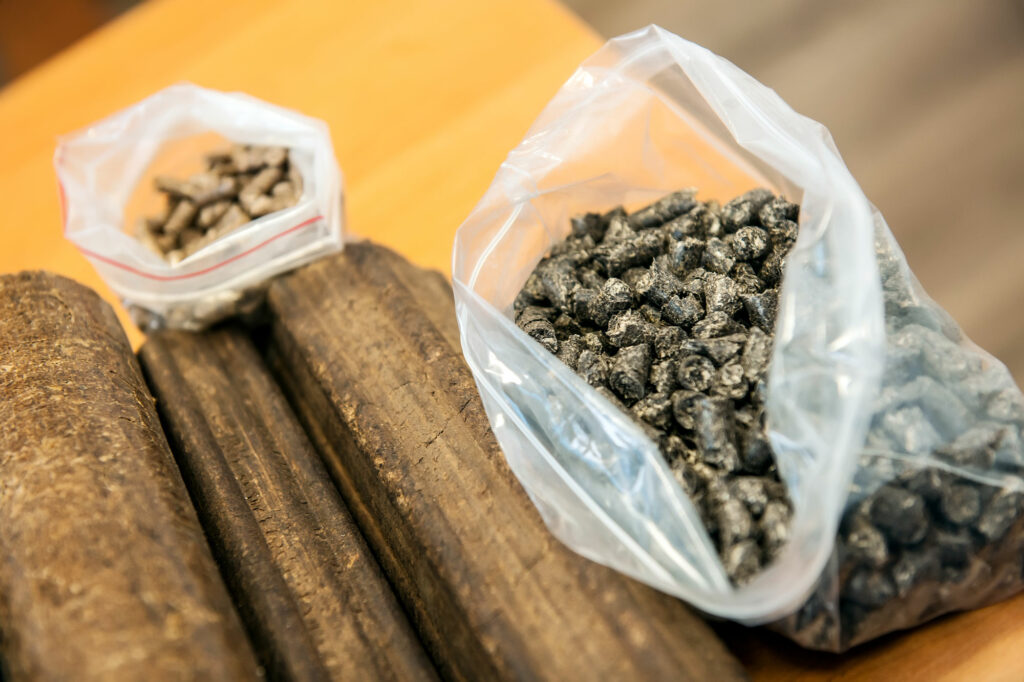 Biomass fuel produced in Moldova
Biomass fuel produced in Moldova
“Participation in green energy projects mobilises and inspires the community”
A rather comprehensive approach to energy efficiency and the use of renewables was undertaken in the village of Festelita, Stefan Voda district. In 2013, Nicolae Tudoreanu, the mayor of the village, made Festelita a signatory of the EU supported Covenant of Mayors East initiative.
“Participation in projects mobilises and inspires the community,” believes Tudoreanu. In 2015, thanks to a grant from the Government of Romania, the local administration managed to repair the premises of the village kindergarten, which is attended by 166 children. As Liuba Vozian, the kindergarten’s head says, “the difference was felt immediately”; it was warmer, and yet the heating bills reduced by 30%. Now, the thermal insulation and new windows help save up to MDL 6,000 [€300] per month.
In the same year, Festelita became part of a larger-scale project, co-financed by the UNDP. Some of the streetlights in the village, as well as in the neighbouring villages of Ermoclia and Popeasca, were equipped with energy saving LED light bulbs. Just 3 km of new street lighting helped to cut expenditure of Festelita villages on street lighting by 50%.
In 2018, Festelita was selected together with three other Moldovan villages to receive EU assistance for the implementation of an energy development strategy as part of the “Covenant of Mayors – Demonstration Projects” initiative, which is part of the Covenant of Mayors East.
Tudoreanu says that, with the support of experts, the local authorities have developed a rather ambitious plan. The buildings of the local council, kindergarten, school and house of culture will be equipped with biomass-fired heating systems, while the street lighting will be replaced wherever necessary with LED bulbs. The project envisages that Festelita will pilot the production of its own energy from sustainable sources, both biomass and above all solar. “Solar panels will give us a chance to distribute energy across the networks and gain proceeds to the local budget [of] up to MDL 1 million [€51,000 ] per year and spend these extra funds on village development,” says Tudoreanu.
According to Tudoreanu, without the support granted by the EU, such plans would have been impossible to implement.
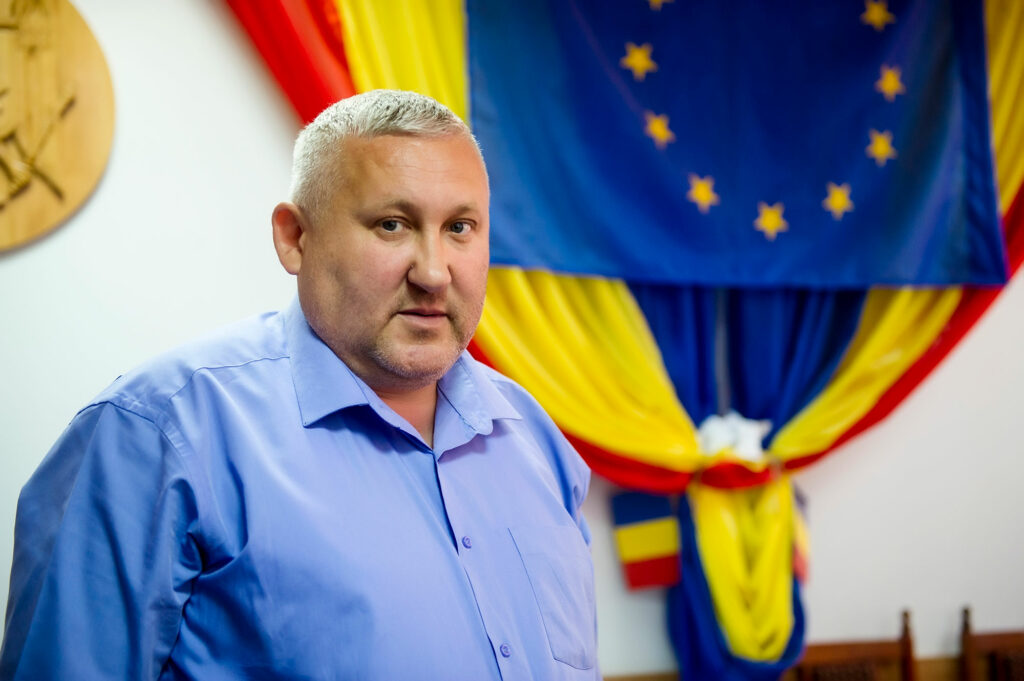 Nicolae Tudoreanu, mayor of Festelita, Moldova.
Nicolae Tudoreanu, mayor of Festelita, Moldova.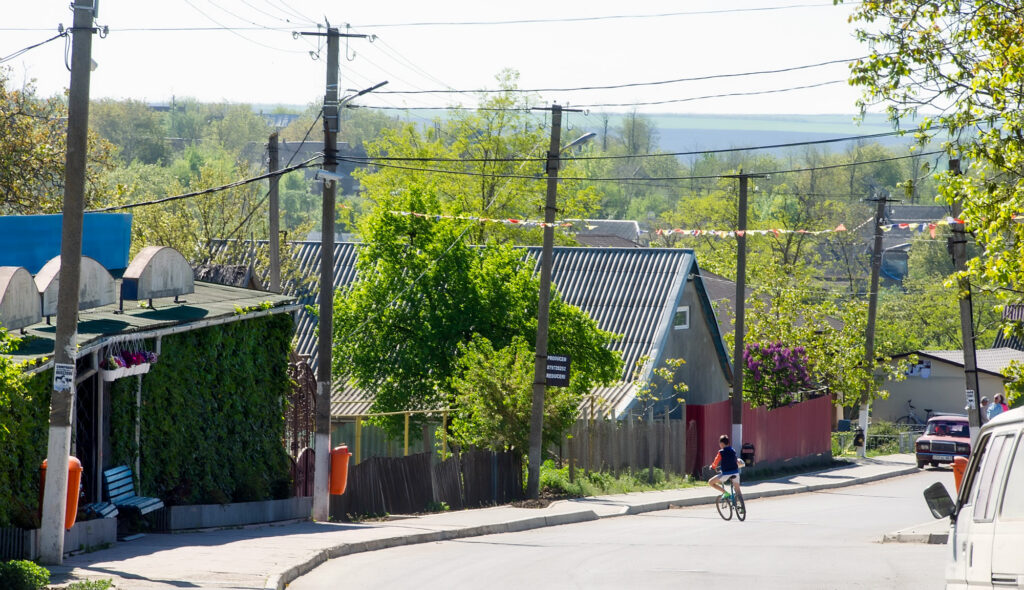 LED street lighting in Festelita, Moldova.
LED street lighting in Festelita, Moldova.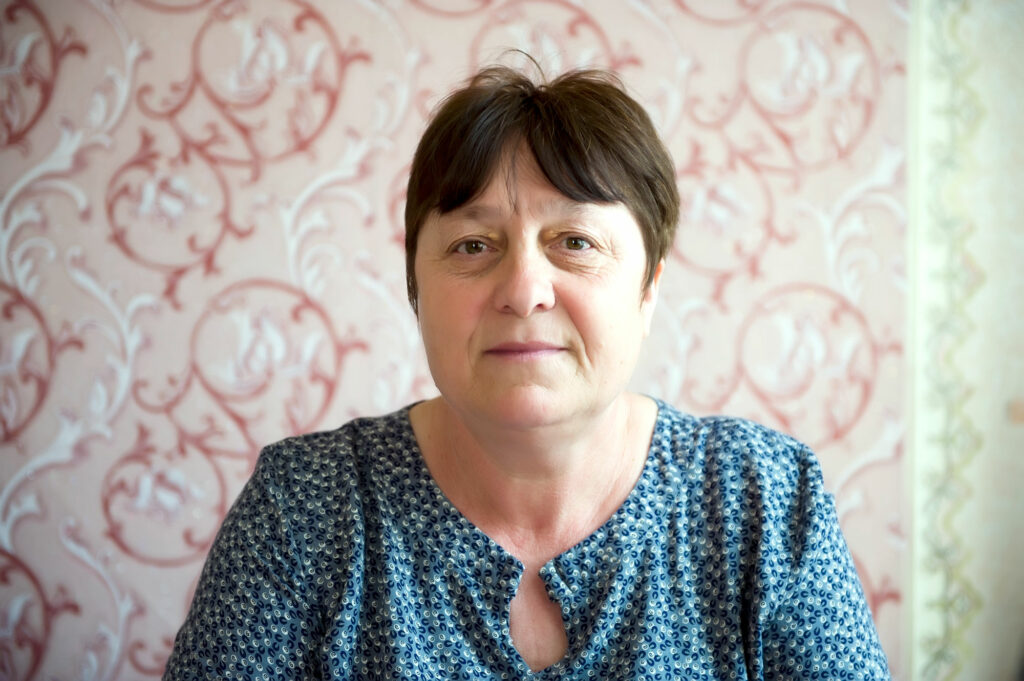 Liuba Vozean, director of Gradinita Voinicel in Festelita, Moldova.
Liuba Vozean, director of Gradinita Voinicel in Festelita, Moldova.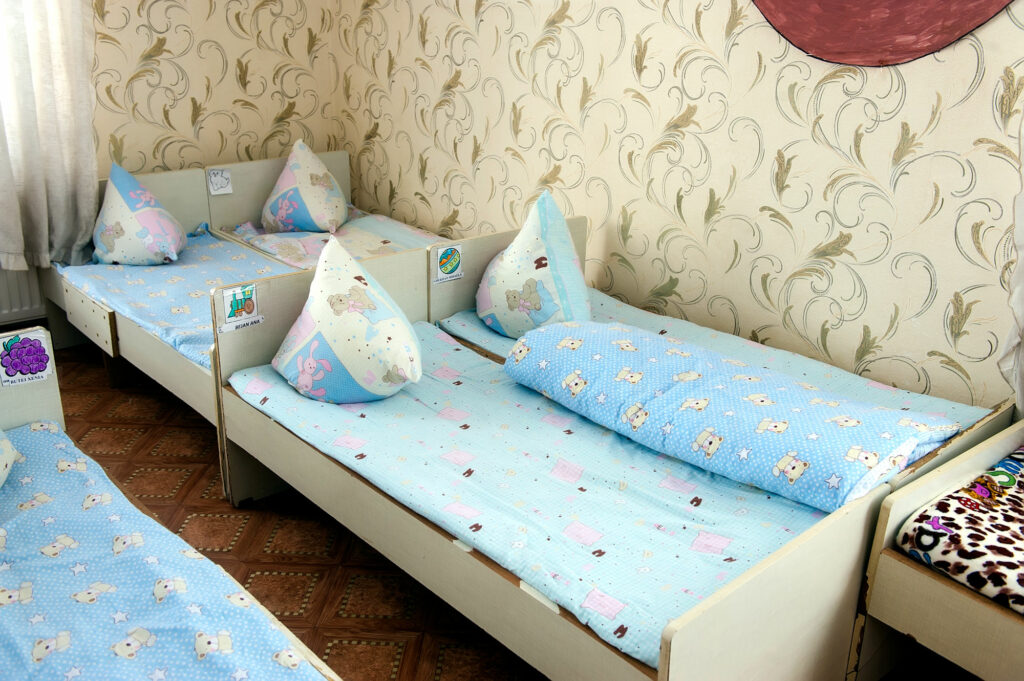 Kindergarten in Festelita village, Moldova.
Kindergarten in Festelita village, Moldova.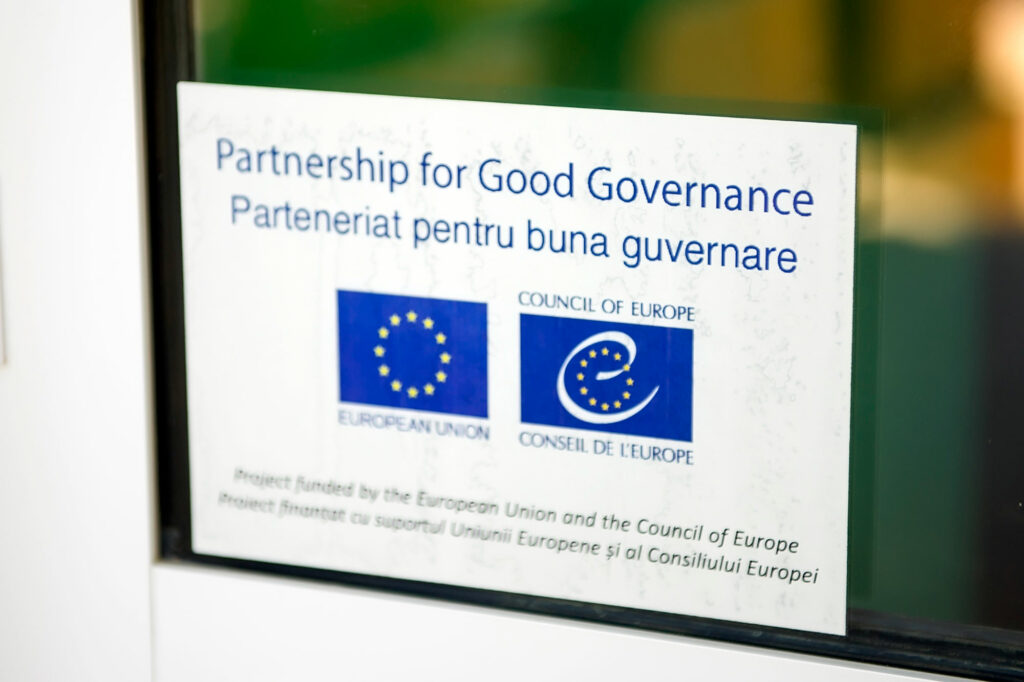 City hall in Festelita, Moldova
City hall in Festelita, Moldova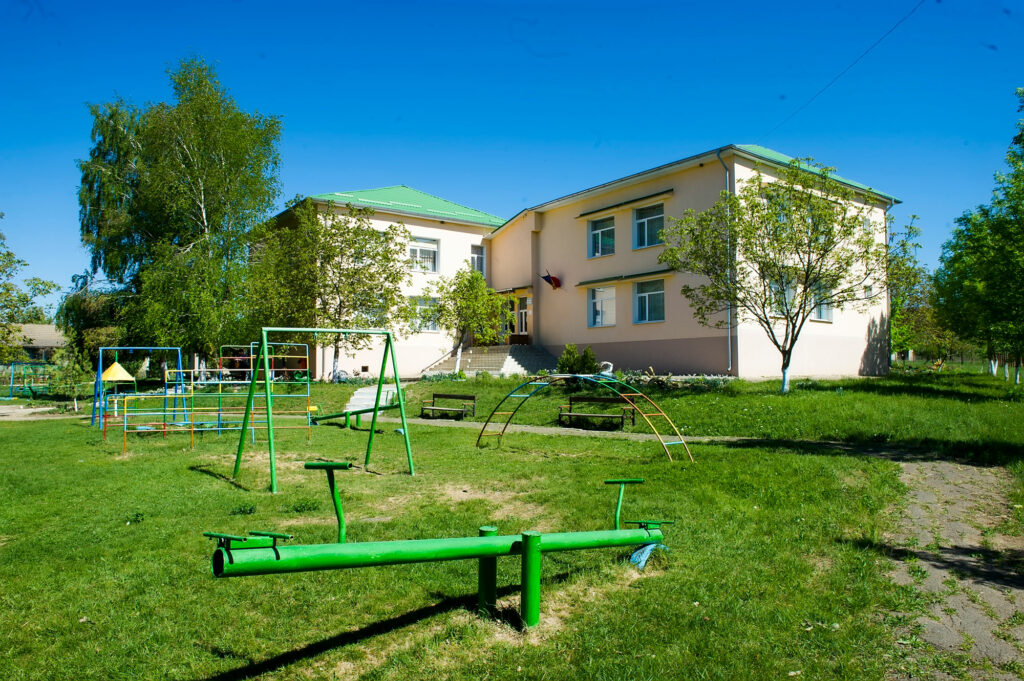 Kindergarten in Festelita village, Moldova.
Kindergarten in Festelita village, Moldova.
Two other communities – Calarasi and Cantemir – have also received support from the EU-funded “Covenant of Mayors – Demonstration Projects” initiative. The two municipalities will use the EU support to implement their Sustainable Energy Action Plans. In Calarasi, more than 21 km of street lighting system will be renovated, whereas in Cantemir, 4 educational buildings will be rehabilitated to the best Energy Efficiency standards.
The EU, through its projects, intends to help Moldova develop its internal energy resources while at the same time developing access to safer and more accessible energy. The projects already implemented are helping Moldova to reduce national energy dependence and consumption, they help to make energy supply more transparent and efficient, thus reducing energy poverty and energy bills for the citizens of the country.
Author: Olga Gnatcova
Article published by Newsmaker.md
MOST READ
SEE ALSO

No, time is not on Russia‘s side

How to open an art business in Moldova: the experience of Alexandra Mihalaș

Be one step ahead of a hacker: check simple cybersecurity tips!

How to act and move on: strategies for women facing discrimination and online harassment
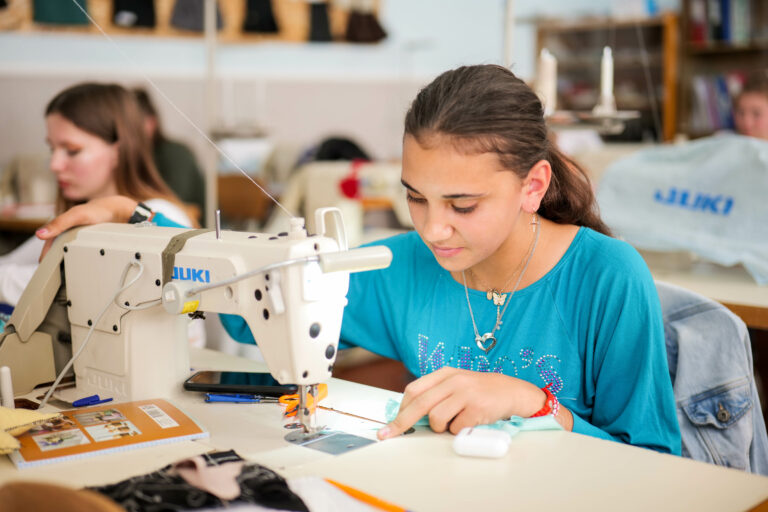
‘Learning is not a process but a journey’: the example of a school in Orhei
More campaign pages:
Interested in the latest news and opportunities?
This website is managed by the EU-funded Regional Communication Programme for the Eastern Neighbourhood ('EU NEIGHBOURS east’), which complements and supports the communication of the Delegations of the European Union in the Eastern partner countries, and works under the guidance of the European Commission’s Directorate-General for Neighbourhood Policy and Enlargement Negotiations, and the European External Action Service. EU NEIGHBOURS east is implemented by a GOPA PACE-led consortium. It is part of the larger Neighbourhood Communication Programme (2020-2024) for the EU's Eastern and Southern Neighbourhood, which also includes 'EU NEIGHBOURS south’ project that runs the EU Neighbours portal.

The information on this site is subject to a Disclaimer and Protection of personal data. © European Union,








